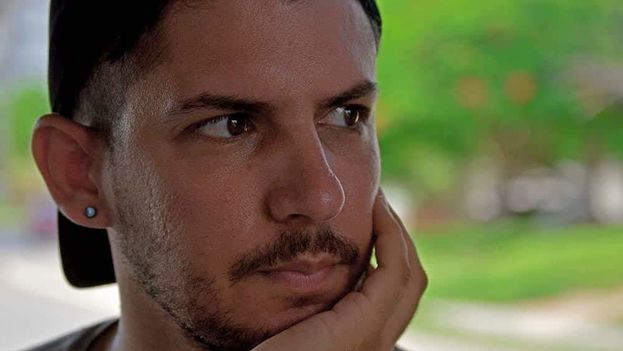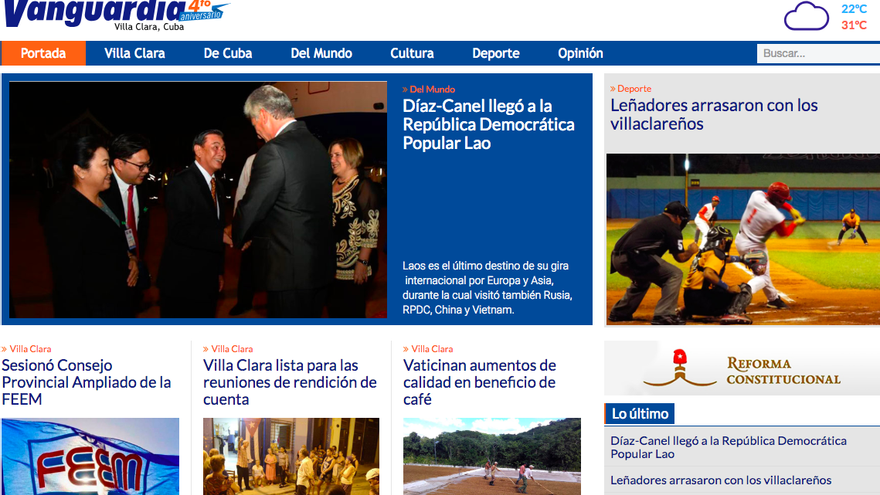
![]() 14ymedio, Luz Escobar, Miami, November 11, 2018 — Two years after several young journalists from the newspaper Vanguardia in Villa Clara wrote a letter strongly criticizing the operation of the official media, 14ymedio spoke with one of the signers of that document to discover the motives that led them to write it and the consequences that it had in their professional lives.
14ymedio, Luz Escobar, Miami, November 11, 2018 — Two years after several young journalists from the newspaper Vanguardia in Villa Clara wrote a letter strongly criticizing the operation of the official media, 14ymedio spoke with one of the signers of that document to discover the motives that led them to write it and the consequences that it had in their professional lives.
Carlos Alejandro Rodríguez Martínez graduated in 2015 from the University of Marta Abreu in Santa Clara and went on to work at the newspaper Vanguardia, the provincial organ of the Cuban Communist Party in the Villa Clara. Now, when he speaks about the letter that changed his life, he makes clear that he does it in a personal capacity and not in the name of the group of writers.
The recent graduates arrived at the newspaper “with the desire to change everything” but they collided with censorship, which he calls “terrible.” The editorial disorder also affected them and in that environment of hostility they decided to write the letter in which they ennumerated their concerns and criticisms regarding the official news spaces.
In the text they reported, among other subjects, that many media outlet bosses rejected articles on social problems because the ideas expressed in them were not in line with “the interests of the country at the current time,” or because they were “too critical.”
Today Rodríguez believes that the only error was signing the letter in the name of the Foundation Committee of the Union of Young Communists (UJC) of the newspaper and he believes that it would have been better for it to appear signed only with the names of each journalist. “The structures of the UJC, at the municipal and provincial level, harassed us and tried to convince us to sign and publish a mea culpa,” he laments.
The text of the retraction was written but never saw the light of day because it didn’t placate the authorities, since it only regretted that the missive had been leaked. “We wrote that letter not to publish it on the internet, but rather to read it in the framework of the Provincial Plenary Session of the Cuban Journalists’ Union in Villa Clara in 2016,” explains Rodríguez.
The publication of the document had the effect of a fragmentation bomb among the journalistic and literary circles of Villa Clara. Various intellectuals circulated emails asking that the young people not be harassed and standing in solidarity with the proposals, but the official Cuban Journalists’ Union (Upec) considered it an intolerable act of “protest.”

“It was hell,” recalls Rodríguez. Following the letter’s publication in various digital media outlets, representatives of the municipal and provincial UJC reproached them for having violated the procedures of the organization, although they were never able to prove that they were responsible for the leak of the text to the independent media.
In reality the letter had been conceived for the Provincial Plenary Session of Upec and sought to reaffirm, specifically, the right of reporters to continue collaborating with independent media in the style of El Toque and OnCuba. “The director of the newspaper told us that we couldn’t collaborate with them but we responded that the laws don’t prohibit it.”
Rodríguez recognizes that it wasn’t only a question of publishing in spaces with greater editorial liberties. “Working in other outlets also helped us to live because with 345 Cuban pesos a month, around $14, nobody lives.” With the salary he was receiving at the Vanguardia newspaper he didn’t have enough “even to pay for the trip from home to work.”
Now, he recalls the moment during the meeting with Upec when one of the signers of the letter rose, began to read it, and all the others put themselves behind her so that she would not be alone. After that in the hallways the other reporters moved away when they saw them or watched them with looks of fear as if they had done something very dangerous.
The climate of pressures became oppressive and as soon as Rodríguez finished his social service he asked for leave from the Vanguardia newspaper. The majority of the other signers who stayed “were leaving sanctioned for different reasons” and the authorities “used very different pretexts” to get rid of them.
Currently Rodríguez is part of the team of Tremenda Nota, a magazine focused on minorities, where he works as editor and reporter. “The advantage of working in independent media is that it opens the doors of imagination and creativity.” Contrary to when one works at an official newspaper where “the doors are shut and you crash into impassable walls.”
Translated by: Sheilagh Carey
_______________________________
The 14ymedio team is committed to serious journalism that reflects the reality of deep Cuba. Thank you for joining us on this long road. We invite you to continue supporting us, but this time by becoming a member of 14ymedio. Together we can continue to transform journalism in Cuba.
